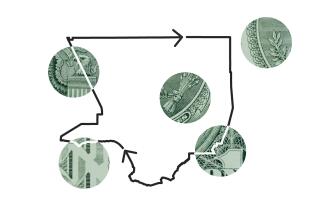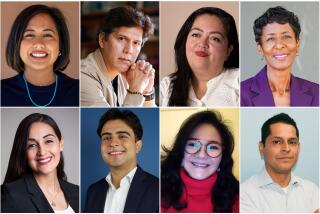Widening Gap for Rich, Poor Candidates
Talk radio for the poor candidates, fat cat fund-raising dinners for the rich.
That’s the story on the local political trail, where once again money dominates. Those without it frantically hawk their message on the only mass electronic medium available free, the talk shows that have replaced community forums in the auto-bound Southland.
This is not new, but the division between rich and poor political campaigns is becoming even more distinct as the cost of running escalates. It means the big campaign donors have too much influence on policy in the local governments that provide the basic services that keep our counties, cities and neighborhoods going.
Big money clout also creates the danger of something worse--fixers who make their contributions on a flat quid pro quo basis, service rendered for contribution given.
Two events Thursday illustrated the state of Election ‘96, local style. One was the appearance on Michael Jackson’s KABC talk radio show of the five challengers to Dist. Atty. Gil Garcetti in the March 26 primary election. The other was a mammoth, $500-a-plate fund-raiser for Mayor Richard Riordan, who isn’t even running this year but is collecting funds for his 1997 reelection campaign.
*
The Riordan fund-raiser at the Century Plaza was old politics from a man who had promised the new.
In 1993, running for his first political office, millionaire Riordan financed most of his campaign out of his own pocket. Thursday night’s event might have surprised some of the ’93 Riordan voters who said they supported him because his wealth immunized him from money-grubbing political practices.
The hotel’s Los Angeles Room was packed with land developers, contractors, real estate lawyers, lobbyists and operators of other enterprises that depend on the city for friendly laws and regulations. About 1,000 had paid $500 each, raising his campaign treasury to $1.7 million.
It looked like an old Tom Bradley or Sam Yorty fund-raiser. Since one or two generations have passed, perhaps some of these guests were the children of those who had paid tribute to the previous mayors, both renowned money raisers.
The architect of this money-oriented affair was the engineer of the more idealistic ’93 campaign, power attorney and Riordan confidant Bill Wardlaw.
Wardlaw was ecstatic, a word I never expected to need to describe this cautious, aloof man. Wardlaw usually patterns his behavior after that of super-reserved Secretary of State Warren Christopher, once L.A.’s most influential back-room power. But as Wardlaw gleefully counted the donors crowded shoulder to shoulder around the several bars, he sounded like a boisterous Bill Clinton.
Such a glittering event is beyond the most hopeful dreams of the five men opposing Dist. Atty. Garcetti, who has $936,310 banked and ready to spend in this month’s primary.
Thursday morning, they arrived at the KABC studios on La Cienega Boulevard for a prime shot on the free-time circuit, Michael Jackson’s morning talk show, whose listeners seem interested in public affairs and likely to vote.
The candidates formed a half-circle around Jackson--attorneys Harold Greenberg and Steve Zand and Deputy Dist. Attys. Malcolm Jordan, John Lynch and Sterling Norris. Garcetti, on business in Sacramento, called in toward the end of the show.
From the start of the program, the challengers hurled insults at Garcetti. Talking about the O.J. Simpson case and other losses by the district attorney’s office, Norris said of Garcetti, “He’s sunk five ships and the captain ought to go down with his ship.” Accusing Garcetti of refusing to debate, Lynch said, “I have been on the campaign trail several months and I can’t find him.”
It was a cacophony of voices, desperately competing for public attention.
*
They were desperate because they knew this was one of their best shots in the campaign and they had to make the most of it. After Michael Jackson, it was back to poorly attended candidates forums and small fund-raisers at friends’ houses.
We need to even things up. Public financing helps. Forcing networks and local stations to give candidates free time would be a big improvement.
Underfinanced opponents shouldn’t be condemned to the whims of talk radio while incumbents dine in style with contributors who, all too often, want something in return.
More to Read
Get the L.A. Times Politics newsletter
Deeply reported insights into legislation, politics and policy from Sacramento, Washington and beyond. In your inbox three times per week.
You may occasionally receive promotional content from the Los Angeles Times.










